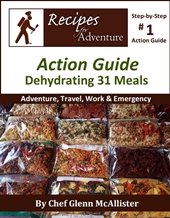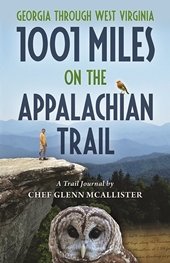Laurel Fork Shelter to Moreland Gap Shelter, 8 miles
MAY 26
Vapor rose from the forest floor in the morning following the rainy night. Max was half asleep on the ground below the feet of Lone Wolf, with one eye on my oatmeal. Lone Wolf was asleep in his bag. I walked away quietly after breakfast and headed toward Kincora Hiking Hostel, two miles away.
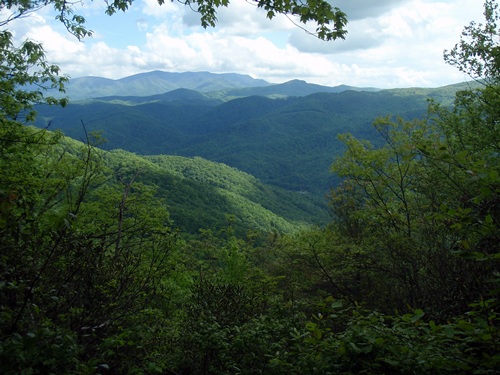
On the way, I came to Laurel Creek Falls, which poured over wide rock steps into a deep, shaded gorge surrounded by rhododendron and eastern hemlock trees. This was the end of the line for trout heading upstream. I walked into the creek across slick stones to filter water. The creek flowed fast, so I put a rock on the intake tube of my water filter to keep the prefilter at the end from washing to the surface in the current.
Update: I have switched from a pump to a squeeze water filtration system. Read my article on water filtration and purification methods.
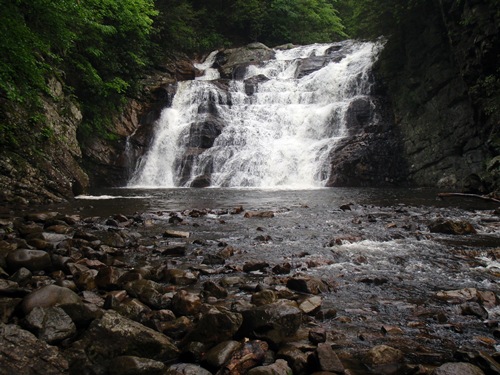
Laurel Creek Falls
Five young thru-hikers sat around the table on the front porch of
Kincora Hiking Hostel. They had been there several days looking after a
woman in their group who was ill. Kincora was a log cabin. It had a
lounge with a sofa, chairs, a wood-burning stove, and a shelf full of
books. Bunk beds were in a backroom. I borrowed shorts and a shirt from
the hiker box, tossed my laundry into the machine, and took a luxurious
shower. While my clothes dried, I used the kitchen stove and utensils to
cook red beans and rice and trail angel cake with chocolate sauce for
dessert. The kitchen wall was covered with Katahdin summit photos that
thru-hikers had sent to Bob Peoples, the proprietor. Bob, revered in
Appalachian Trail circles, leads trail maintenance projects for
thru-hikers to participate in when they arrive at the annual Trail Days
Festival in Damascus, Virginia. Bob was in Spain during my visit, but
the hostel stayed open with five-dollar suggested donations, which I
gladly contributed. When it stopped raining, I set out for Moreland Gap
Shelter—six miles away and mostly uphill.
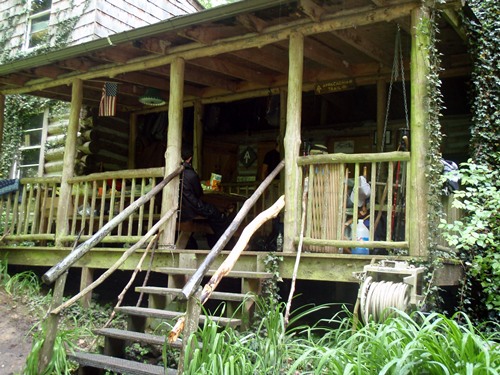
Kincora Hiking Hostel, Appalachian Trail
The strenuous climb
wore me out. When I took off my pack, a sharp pain radiated between my
lower back and right hip. I tied my tarp between two trees beside the
shelter and walked gingerly over to some nice folks at the picnic table.
One young thru-hiker, with the unfortunate trail name Shitty Pot,
cooked two batches of spaghetti and grits. He seemed pretty happy with
that concoction. I made lasagna with a side of ratatouille and peach cobbler
for dessert. A friendly couple, New Knees and Siva, cheered as I
attempted to hang my food bag in front of the shelter. Throwing the rock
sack toward the branch, I felt like a pitcher on the mound—missing the
strike zone, foul balls, etc. When I finally got the line over the
branch and the bag hung, it hung too low—easy pickings for a bear. So, I
aimed higher and succeeded shortly before sundown.
During the
night, cold wind blew through the open ends of the tarp. On a warm
night, the airflow would have been welcome. I slept in my long johns,
fleece jacket, and wool cap. The ground sloped to the left, causing me
to slide off my sleeping pad throughout the night. I tried sleeping on
my back with my knees up to alleviate the back pain, but that wasn’t my
normal sleeping position. I spent most of the night on my stomach,
switching arms under my head every so often when they fell asleep. It
was a long night.
I used a thin foam sleeping pad on this hike, but I wish I had invested in the more comfortable sleeping pad below:
Next Day:
Moreland Gap Shelter to Mountaineer Shelter
Previous Day:
Vandeventer Shelter to Laurel Fork Shelter
Table of Contents:
Share this page with friends on social media.



